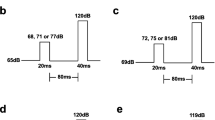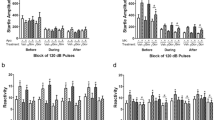Abstract
Rationale: Prepulse inhibition of acoustic startle refers to the reduction in the startle response when the startling stimulus is preceded by a weak prepulse stimulus. This phenomenon provides an operational measure of sensorimotor gating that has been found to be reduced in patients with schizophrenia and rats treated with serotonin agonists or serotonin releasers. Objective: In this study, we compared the effects of a serotonin releaser, MDMA, on prepulse inhibition in laboratory rats and healthy human volunteers. In particular, we investigated whether MDMA disrupts PPI in humans as observed in animal studies. Methods: Rats were tested after placebo and MDMA in a counterbalanced order at an interval of 1 week, with separate groups of rats being used for each dose of MDMA (1.7, 5.4 and 17.0 mg/kg). On each test day, rats were first tested after no injections and retested 2 h later, 10 min after a subcutaneous injection of placebo or MDMA. For the human study, a placebo-controlled within-subject design and double-blind procedures were used. Subjects were examined twice at a 2 to 4 week interval after either placebo or drug administration (order being counterbalanced). On each test day, subjects underwent baseline testing including psychological and PPI measures. Ninety minutes later, subjects received placebo or MDMA (1.7 mg/kg PO) and were retested after 75 min during the peak of behavioral effects of MDMA. Results: As expected, MDMA decreased prepulse inhibition in a dose-related fashion in rats. In contrast, a typical recreational dose of MDMA (1.7 mg/kg, orally) increased prepulse inhibition in subjects experiencing robust psychological effects. Conclusions: This surprising disparity between the effects of the drug in rats and humans may reflect a species-specific difference in the mechanism of action of MDMA or in the behavioral expression of a similar pharmacological effect, or both.
Similar content being viewed by others
Author information
Authors and Affiliations
Additional information
Received: 3 April 1998/Final version: 5 November 1998
Rights and permissions
About this article
Cite this article
Vollenweider, F., Remensberger, S., Hell, D. et al. Opposite effects of 3,4-methylenedioxymethamphetamine (MDMA) on sensorimotor gating in rats versus healthy humans. Psychopharmacology 143, 365–372 (1999). https://doi.org/10.1007/s002130050960
Issue Date:
DOI: https://doi.org/10.1007/s002130050960




